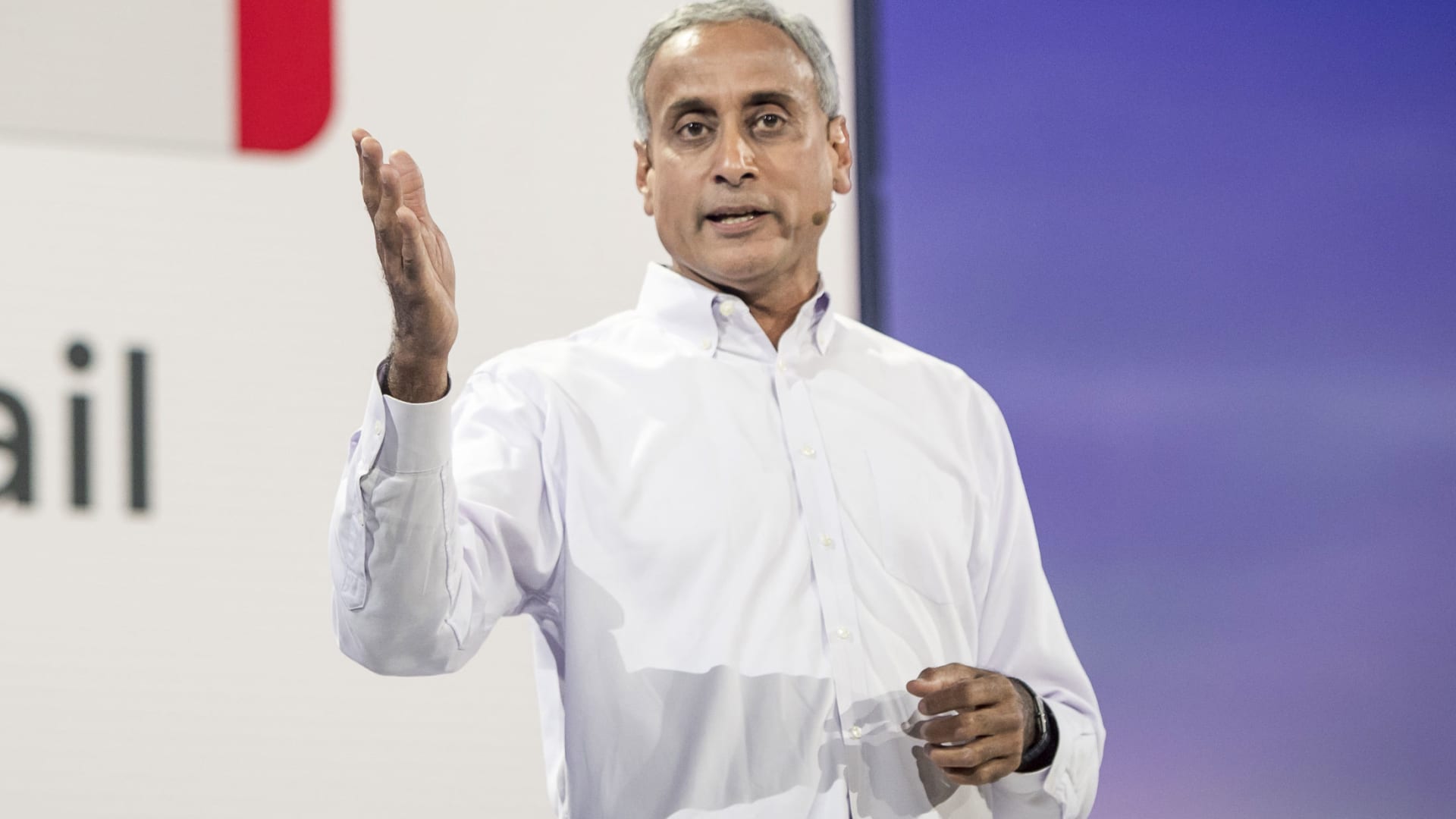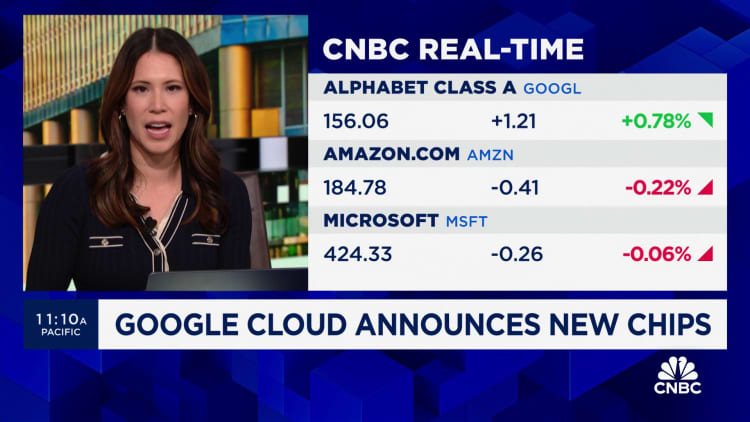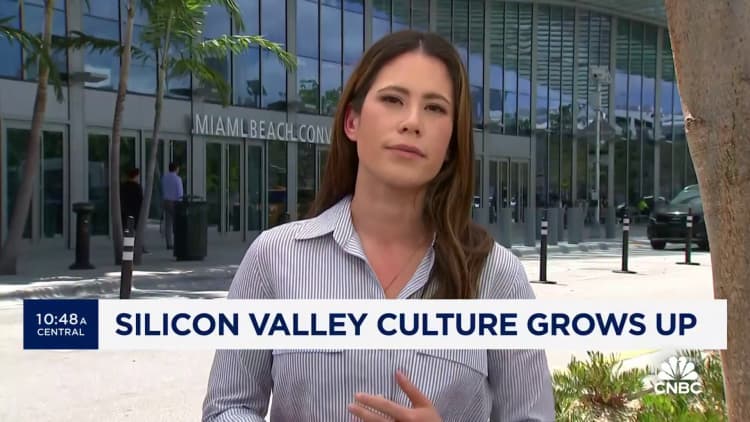

Prabhakar Raghavan, senior vice president at Google, speaks during the US Conference of Mayors Winter Meeting in Washington, DC, US, on Wednesday, Jan. 17, 2024.
Julia Nikhinson | Bloomberg | Getty Images
Wearing a hoodie with the words “We use Math” on the front, Google search boss Prabhakar Raghavan had an important message for employees at an all-hands meeting last month. But he first wanted them to settle in and get comfortable.
“Grab your boba teas,” Raghavan told the crowd, gathered in a theater at the company’s headquarters in Mountain View, California.
Raghavan, who reports directly to CEO Sundar Pichai and leads key groups including search, ads, maps and commerce, was addressing Google’s knowledge and information organization, which consists of more than 25,000 full-time employees.
“I think we can agree that things are not like they were 15-20 years ago, things have changed,” Raghavan said, according to audio of the event obtained by CNBC. He was referring to the search industry, which Google has dominated for two decades, emerging as one of the most profitable and valuable companies on the planet along the way.
Raghavan said Google’s digital ad business had become “the envy of the world.” He noted that over the last three years, annual revenue has grown by more than $100 billion, exceeding Starbucks, Mazda and TikTok combined.
At a company long known across Silicon Valley for its free, gourmet lunches and endless on-campus perks, Raghavan’s comments serve as the latest warning to employees that growth for Google is getting harder.
“It’s not like life is going to be hunky-dory, forever,” he said.
Over roughly 35 minutes, Raghavan peppered his reality check address with sports metaphors and rallying cries.
“If there’s a clear and present market reality, we need to twitch faster, like the athletes twitch faster,” he said.
He referenced heightened competition and a more challenging regulatory environment. Though he didn’t name specific rivals, Google is facing pressure from the likes of Microsoft and OpenAI in generative artificial intelligence.
“People come to us because we are trusted,” Raghavan said. “They may have a new gizmo out there that people like to play with but they still come to Google to verify what they see there because it is the trusted source and it becomes more critical in this era of generative AI.”
Raghavan had some tangible changes to announce. He said the company plans to build teams closer to users in key markets, including India and Brazil, and revealed that he’s shortening the amount of time that his reports have to complete certain projects in an effort to move faster.
“There is something to be learned from that faster-twitch, shorter wavelength execution,” he said.
Google’s cloud business has also instructed employees to move within shorter timelines despite having fewer resources after cost cuts, sources with knowledge of the matter told CNBC.
“With a huge opportunity ahead, we’re moving with velocity and focus,” a Google spokesperson told CNBC, when asked to comment on Raghavan’s address. The spokesperson highlighted the addition of generative AI to search and improvements in search quality, adding, “There’s lots more to come.”
In March, Google named company veteran Elizabeth Reid to the role of vice president, leading search and reporting to Raghavan.
‘High highs and low lows’
In many respects, Raghavan’s tone was nothing new. Google has been in cost-cutting mode since early 2023, when parent Alphabet announced plans to eliminate about 12,000 jobs, or 6% of the company’s workforce. Job cuts have continued this year, with more layoffs in early 2024, and CFO Ruth Porat said in a memo last week that the company is restructuring its finance organization, a move that will involve additional downsizing.
But Raghavan is making clear that what’s happening now isn’t just a continuation of 2023. He noted that his group’s last all-hands meeting was three months ago, though for some it felt like three years.
“We’ve had a lot go on in these last three months,” consisting of “really high highs and low lows,” he said.
In that time, Google introduced its AI image generator. After users discovered inaccuracies that went viral online, the company pulled the feature in February. Google has been reorganizing to try and stay ahead in the AI arms race as more users move away from traditional internet search to find information online.
In Alphabet’s upcoming earnings report on Thursday, Wall Street is expecting a second straight quarter of year-over-year revenue growth in the low teens. While that marks an acceleration from the few quarters prior, the numbers are also in comparison to some of Google’s weakest reports on record.
Even though Alphabet reported better-than-expected revenue and profit for the fourth quarter, ad revenue trailed analysts’ projections, causing the company’s shares to drop more than 6%. Meanwhile, the AI boom is forcing a renewed focus on investments.
“We’re in a new cost reality,” Raghavan said. With generative AI, the company is “spending a ton more on machines,” he said.
Organic growth is slowing and the number of new devices coming into the world “is not what it used to be,” Raghavan said.
“What that means is our growth in this new operating reality has to be hard earned,” he added.
A smart phone displaying Google with Google Gemini in the background is being featured in this photo illustration in Brussels, Belgium, on February 8, 2024.
Jonathan Raa | Nurphoto | Getty Images
Raghavan said that additional challenges are emerging as the company is “navigating a regulatory environment unlike anything we’ve seen before.”
He cited the European Union’s Digital Markets Act and said the company is still learning what its obligations will be from the European Commission. The DMA, which officially became enforceable last month, aims to clamp down on anti-competitive practices among tech companies.
“That does have its impact on us,” Raghavan said.
Raghavan urged employees to “meet this moment” and “act with urgency based on market conditions.”
“It won’t be easy,” he said. “But these are the moments and the history of industries that will define us.”
120 hours a week
Raghavan said Google has to address its “systemic” challenges and build “new muscles that maybe we have let fall off for a bit.”
He praised the teams working on Gemini, the company’s main group of AI models. He said they’ve stepped up from working 100 hours a week to 120 hours to correct Google’s image recognition tool in a timely manner. That helped the team fix roughly 80% of the issues in just 10 days, he said.
However, Google still hasn’t brought back the ability to generate images of people. Demis Hassabis, Google’s AI leader, said in February after the tool was taken down that it would be re-released in weeks.
Raghavan clarified that the failure in image generation wasn’t due to a lack of effort.
“I want to be clear, this wasn’t some case of somebody slacking off and dropping the ball,” he said.
Raghavan said the company has shown the ability to move quickly on important matters. As an example, he highlighted an effort in 2023, when the Bard team (now Gemini) and Magi team, which focuses on AI-powered search, launched products within a matter of months.
It was something the company couldn’t have accomplished, he suggested, with bigger numbers.
“The realization was ‘gosh, if we had thrown 2,000 engineers at these projects, we wouldn’t have got it done,'” he said, indicating that the company would be paying close attention to the size and scope of teams.
Raghavan also spoke to critics of the company’s bureaucracy.
Employees have complained for years that Google’s growing bureaucracy has crippled their ability to launch products quickly. That worsened as the company rapidly expanded its workforce during the pandemic.
In 2022, in addition to Google’s annual survey called Googlegeist, Pichai launched a “Simplicity Sprint” to gather employee feedback on efficiency.
“The number of agreements and approvals it takes to bring a good idea to market — that’s not the Google way,” Raghavan said. “That’s not the way we should be functioning.”
Raghavan said leaders are actively working on removing unnecessary layers in the hierarchy, echoing prior comments from Pichai.
“We’ve learned a lot the last few quarters,” Raghavan said. “I cannot tell you that all the stumbles are behind us. What matters is how we respond and what we learn.”





